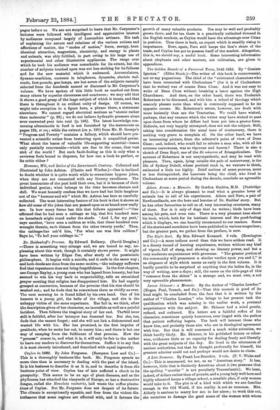Dr. Heidenhofs Process. By Edward Bellamy. (David Douglas.) —There is
something very strange and, we are bound to say, mi- l:dossing about this work, though it certainly shows power. It might have been written by Edgar Poe, after study of the pessimistic ,philosophers. It begins with a suicide, and it ends in the same way ; and both deeds are done from the same motive,—the unhappy sufferers find that repentance does not bring forgetfulness. In the first chapter, one George Bayley, a young man who has lapsed from honesty, but has seemed to win his way back to respectability, tells an astonished prayer meeting that religion has disappointed him. He had eagerly grasped at conversion, because of the promise that his sins should be washed out ; and he finds that he remembers them as vividly as ever. The next morning he is found killed by his own hand. One of his hearers is a young girl, the belle of the village, and she is the unhappy victim of the same experience. Her fall is, we think, after the description given of her character, an incredible as well as a painful incident. Then follows the tragical story of her end. The'Old lover still is faithful, after her betrayer has deserted her. But she, too, finds that she cannot forget; and she will not link a dishonoured and wasted life with his. She has promised, in the first impulse of gratitude, when he seeks her out, to marry him ; and there is but one way of escaping from the fulfilment of that promise. How the "process" comes in, and what it is, it will only be fair to the author to leave our readers to discover for themselves. Suffice it to say that it is most cleverly introduced, and described with equal ingenuity.


































 Previous page
Previous page